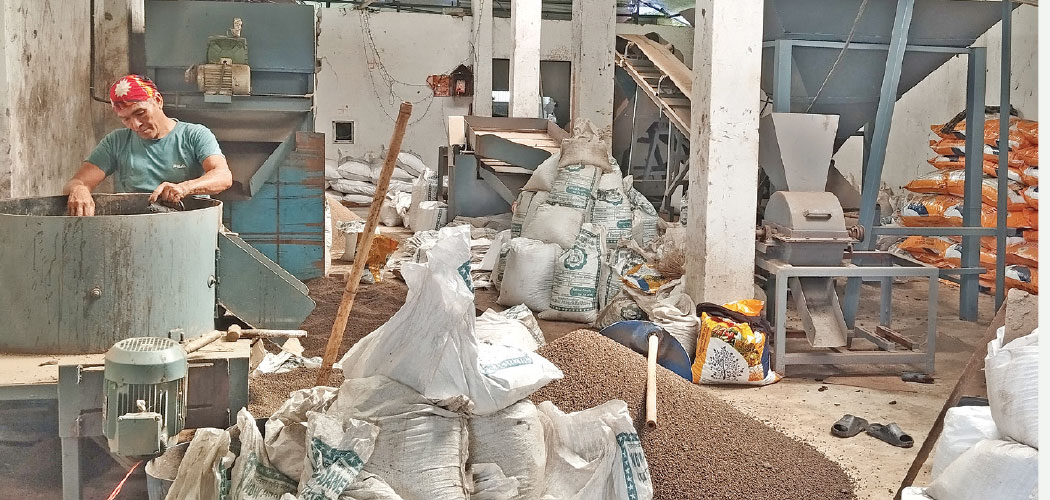
SATV Kathmandu Oct 14: The use of organic fertiliser as an alternative to chemical inputs like urea, DAP, and potash is steadily gaining traction among farmers in Morang and across Koshi Province, thanks to the efforts of a local entrepreneur who returned from abroad with a vision for sustainable agriculture.
Rajiv Khadka of Bansbari, Urlabari Municipality-9, has established a successful organic fertiliser industry producing 5,000 kg of granular fertiliser daily.
His enterprise, Hamro Organic Fertiliser Industry, currently employs 15 people and supplies fertiliser to all districts of Koshi Province.
According to him, he is producing three types of fertiliser targeting mustard, wheat and potato crops planted in winter.
Around 100 tonnes of organic fertiliser is ready to be supplied to various districts.
Currently, 15 people are employed in the industry that is producing granular fertiliser using automatic machines.
He said that he invested around Rs. 32.5 million in the fertiliser industry.
He had invested all the money he earned while living in Dubai, Qatar and Kuwait for 16 years in animal husbandry and organic fertiliser production. However, as he was not getting good returns from raising cows and goats, he stopped raising animals and is producing only organic fertiliser.
Khadka, who lived in Dubai with his family, returned to Nepal in 2019 to engage in agricultural enterprise.
“The firm named Aama Agriculture Firm, which started in 2020, could not provide financial benefits. Income and expenses are equal. After that, I established Hamro Organic Fertilizer industry. Organic fertiliser industry has given good results," he said.
According to Khadka, so far, the fertiliser has taken the market in all districts of Koshi Province. There has been good feedback from user farmers, he said. Local governments have made agreements to produce fertiliser.
Moreover, if the provincial and federal governments also provide subsidies for production, organic fertiliser can be produced from domestic raw materials according to demand, Khadka said.
In the early days, the industry, which was producing fertiliser by focusing on nurseries, vegetable farming, and fruit farming, is now producing enough for paddy, maize, wheat, and mustard crops.
Stating that weeds and diseases have entered through chemical fertilisers, he said, "Our fertilisers have been proven to contain nitrogen 2 per cent, potassium 2.78 per cent, phosphorus 3 per cent, organic carbon 21 per cent and a pH level of 7.7.
He said that as the fertilisers were tested in a government-approved lab, all the elements found in chemicals are found in organic fertilisers.
This granular fertiliser is made from a mixture of cow dung and 12 other elements, he said.
According to him, he was attracted to the agricultural sector by his association with agricultural scientists from Mumbai while living in Dubai and Kuwait.
"When I came home and started building a shed, many people were surprised from my work. However, I came to Nepal with the dream I had. I am on a mission to fulfill it.
Khadka said that if the government manages the market, chemical fertilisers can be replaced by organic fertilisers within three to four years.
According to statistics, the government provided a subsidy of Rs. 27.95 billion on chemical fertilisers last year alone.



















